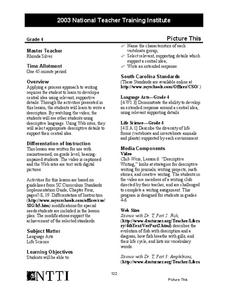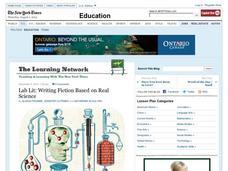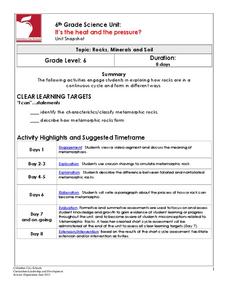Curated OER
Write a Description
Finding the central idea is the focus of this lesson. Middle schoolers write descriptions of different animals using details and descriptive language. They watch a video of kids using descriptive language, and then use showing language...
Curated OER
A Whale of Importance to the Arctic People
The bowhead whale of the Arctic region is of great importance to the people that live there. Your class will brainstorm all they know about this wonderful whale and create an informational video, which they will share with the children...
Project Noah
Writing Goes Wild
Young scientists develop their observation and writing skills as they craft and then post a detailed description of a plant or animal they have spotted and photographed.
Columbus City Schools
To Measure its Mass or Volume?
Atoms, elements, and molecules, oh my! Teaching the fundamentals of chemistry to curious sixth graders has never been easier to accomplish. Here is a resource that pulls together everything needed to get them off to a good start,...
Berkshire Museum
Nature Journaling: Experience the Outdoors Through Writing and Drawing
Step into the great outdoors and develop young scientists' skills of observation with a nature journaling lesson plan. Given a specific focus or goal, children practice making and recording observations of nature through written...
Curated OER
"Snapshot" Exercises & Sensory Detail Word Bank
Read a sample of creative descriptive writing to your science class. Discuss how writing can be used to record and communicate observations that scientists make. Reading selections and thought-provoking questions are suggested. Also...
Chymist
Writing Chemical Equations
Communicate chemistry clearly with a concise guide to writing chemical equations. It covers everything from the parts of a chemical equation to the different types of reactions that budding chemists may encounter.
National Science Teachers Association
The Ethanol Project
In a mock senate hearing regarding the development of ethanol as a fuel source, each person in the class is assigned a role to play and must uphold the stance of their character. Once the senate hearing is complete, each person writes a...
Curated OER
A Seashell Lesson: Writing for Detail and the Scientific Process
Practice descriptive language in this lesson, which prompts elementary and middle schoolers to write detailed descriptive sentences describing a seashell. They write a description of a shell, create an illustration, and other students...
Curated OER
Water Cycle Reading and Writing
Here is a great way to get pupils to express a scientific concept in a fun way. After hearing the story of Walter the Water drop and learning facts about the water cycle, the class will write a creative expository piece describing what...
Curated OER
Writing Exercises: The Environment and Sustainability
Sometimes it's good to challenge our kids with thought-provoking topics. They'll have to think hard and use what they know to answer these essay questions. They'll discuss how and why developed nations put a strain on the world's...
Center for Learning in Action
Introduction to Matter
Begin your states of matter lessons with a demonstration designed to introduce the concept that all matter has properties. Reinforce this concept through vocabulary exploration, and the creation of atom models; salt, water, and carbon...
K12 Reader
A Planet in the Solar System
Take young scientists on an exploration of the cosmos with this cross-curricular writing exercise. Tasked with producing an expository composition describing a planet of their choosing, students perform research and...
Georgian Court University
Introduction to Marsh Ecology
Compare and contrast the characteristics of fresh and salt water marshes. After exploring the typical plants and animals found in each marsh type, participants use a set of flash cards to sort into fresh and salt water marsh life. Their...
University of Kentucky
Beneficial Bug Scavenger Hunt
Many people think of bugs as annoying pests to be squashed, but most insects and spiders are beneficial, eating the actual pests or pollinating plants. After reviewing some of the common bugs in your area (they may differ from those...
The New York Times
Writing Fiction Based on Real Science - NYTimes.com
Refuse to alienate your scientific-minded young scholars during your creative writing unit. Learners explore how literary writing can reflect observable fact, and be based in actual science. The links include examples of fiction and...
Berkshire Museum
Backyard Rocks
You don't have to travel far to learn about rocks, just step outside, pick up a stone, and begin investigating. After taking a class walk around the school grounds collecting rocks, young scientists practice their skills of observation...
Student Handouts
Process Steps
A straightforward graphic organizer is a great way to outline steps for any subject. Kids fill out 10 steps to describe a process or brainstorm writing, with small arrows indicating that one step leads to the next.
Advocates for Human Rights
The Right to a Clean Environment in the United States
Even if a school has gone digital, chances are there's still plenty of paper being used. The three activities help scholars learn about the environmental impact of paper and another consumer products of their choosing, the issue of...
Science Matters
Formative Assessment #6: Photosynthesis Cellular Respiration
You know you taught it, but did they learn it!?! A quick formative assessment asks pupils to describe both photosynthesis and cellular respiration before showing how they relate to each other. The lesson marks the 20th lesson in a...
Chymist
An Experiment in Alchemy: Copper to Silver to Gold
Use chemistry to change pennies into gold coins! The experimental procedure leads learners through the process of changing copper pennies to silver and then to gold. They record the mass of each coin through every step of the experiment.
Curated OER
Describe Environmental Interrelationships
Students describe environmental interrelationships using list of criteria. They are able to explain organism interaction, based on definitions provided. Also, students can use references and worksheets, to describe effects of pollution...
Columbus City Schools
It's the Heat and the Pressure?
Ready for a change? Give a comprehensive collection of metamorphic materials a try! With the assortment of printables and lab activities, you won't be under pressure to keep things lively. The unit culminates by having...
American Museum of Natural History
Make Your Own Astronomy Stationary
Scholars follow five steps to create personalized, astronomy-themed stationary.























